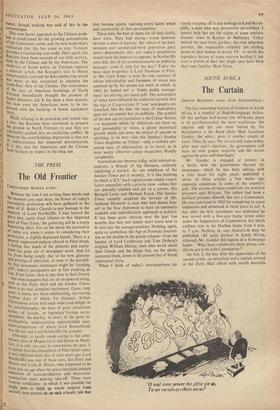THE PRESS
The Old Frontier
Between the time I am writing these words and the moment you read them, the flower of today's
Journalistic profession will have gathered in the Pews of St. Bride's Church to pay homage to the memory of Lord Northcliffe. I may hazard the Suess that, amid ritual tributes to this 'departed giant of Fleet Street,' the gathering will be a pretty depressing affair. For on the whole the journalists f today are, when it comes to considering their Profession, a slightly depressed bunch. There is a general suppressed malaise abroad in Fleet Street, a feeling that much of the glamour and excite- ment has gone oilt of newspaper work. And it's far from being simply due to the new glamour and prestige of television, or even to the possibil- ity that newspaper techniques might be 'standing today's newspapers are in fact evolving as last, if not faster, than at any time in their history --but even in papers that are on an upward swing, such as the Daily Mail and the Sunday Times, there is no real attendant excitement. Gone, long gene, it seems, are those exhilarating, rip-roaring frontier days of which, for , instance, Arthur Christiansen wrote with such wide-eyed delight in his autobiography, the days of great circulation battles, of 'scoops,' or legendary' foreign corre- sPondents, the heyday, in short, of the great in- dividualistic, .whip-cracking unpredictable jour- nalist-pro.prietors—of whom Lord Beaverbrook Was the last and Lord Northcliffe the greatest. Although, as hardly needs saying in this anni- versary Year of Magna Carta and Simon de Mont.- fort, it is only too easy to romanticise the past, it iS certain that the atmosphere of Fleet Street today is very. different from that of sixty years ago. Lord Northcliffe was one of those men, like Ford and Hearst and Louis B. Mayer, who happened to be horn into an age when the great twentieth-century industries of mass-production and mass-com- munication were nearing take-off. These were frontier conditions—in which it was possible for single men to build up whole empires from scratch, men carried up on such a heady tide that
they became giants, realising every latent whim and eccentricity of their personalities.
These men, the best of them, for all their faults, were alive. They had energy, vision however twisted, a sense of humour. But which of the busi- nessmen and second-and-third generation great men's descendants who are today's proprietors would have the humour to appoint, as Northcliffe once did, one of his commissionaires as publicity manager--even if only for the day? Today the beau ideal proprietor is Lord Thomson of Fleet, or Mr. Cecil King—a man the true measure of whose individuality and freshness of vision was summed up by his speech last week in which, in 1965, he 'lashed out' at 'fuddy duddy manage- ment' for playing too much golf. The newspapers of today have followed the industrial pattern into the Age of Corporations. If 'new' newspapers are launched, like the Sun. the mass of expenditure goes not on content but on publicity. The symbol of the new age in journalism is the Colour Section —a magazine which by definition can have no real personality or views, a glossy parasitical growth which can never be critical of anyone or anything, at its best—like this Sunday's Sunday Times magazine on 'Crime'—only a stylishly pre- sented mass of informatinn, at its worst, as in most weeks' Observer colour magazines, blandly sycophantic. Journalism has become today, with isolated ex- ceptions, a branch of big 6usiness, solemnly supplying a market. As one employee of the Sunday Times put it recently, 'it is like working for Shell or ICI.' Such organisations simply cannot foster journalists with a private view—unless they are specially labelled and put in a corner, like Bernard Levin and Michael Frayn. The Sunday Times recently acquired the services of Mr.. Anthony Howard—a man who had shown him- self in the New Statesman to have an eminently readable and individualistic approach to politics. It has been, quite obvious over the past few months that they just simply don't know how to
fit him into the sausage-machine. Nothing, again, quite so symbolises the Age of Formula Journal- ism as the decline in the gossip column—from the heyday of Lord Castlerosse and Tom Driberg's original William Hickey, men who wrote about their friends and the things that, on the whole, interested them, down to the present day of bland, impersonal trivia.
When I think of today's newspapermen de-
voutly trooping off to pay homage to Lord North- cliffe, a man who was personality personified, I cannot help but see the vision of some onetime frontier town in Kansas or Nebraska. Today behind the neat front gardens, the trim suburban porches, the respectable citizenry are settling down in their homes to watch TV: to watch the legendary heroes of some western battling it out over a stretch of dust that might once have been their own familiar Main Street.
















 Previous page
Previous page